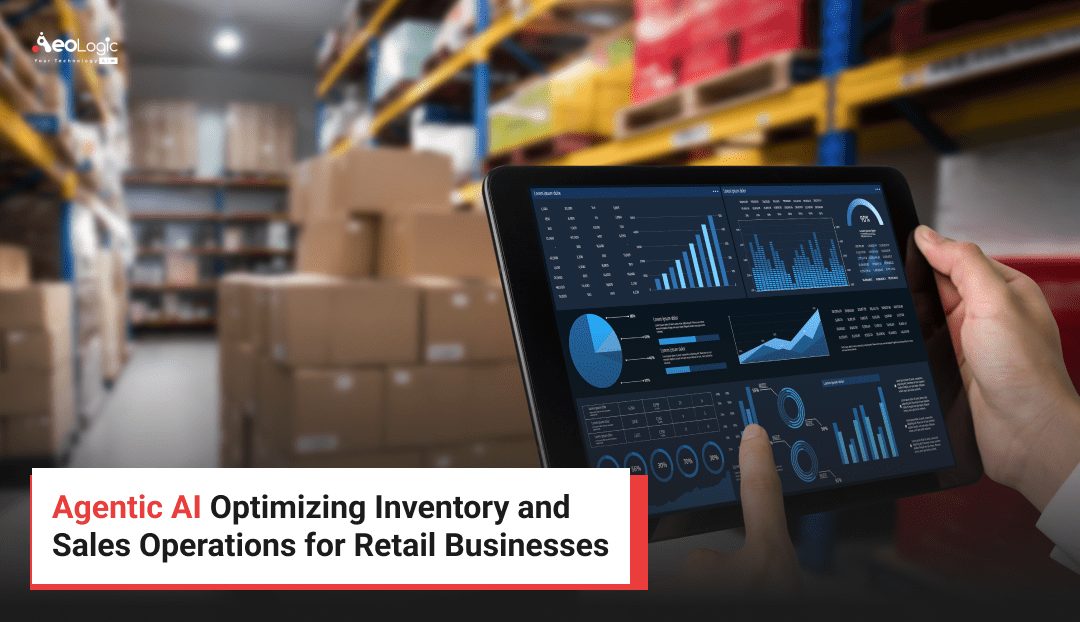Retail businesses are growing every day, and it is also beneficial for the customers to have choices and options. The retail businesses are also adapting various technologies like RFID, IoT, AI, blockchain, etc, that surely boost their digital transformation. But still, there are many retail businesses that are using conventional forms of technologies and techniques that are not providing them the most benefit to survive in the advanced and high expectations world.
The conventional technologies have emerged with various issues like bad optimization and management of inventory, bad efficiency, quality degradation, customer dissatisfaction, inefficient store management, bad optimization of supply chain, lack of data-driven decision making, delivery issues, lack of tracking, weak cybersecurity system, and much more. To enhance all these aspects, the retail businesses should adopt the agentic AI in retail businesses.
Overview
Many retail businesses have adopted the agentic AI solutions and have boosted their sales and optimization of inventory management. The autonomous solutions powered by agentic AI can automate the various inventory operations like inventory monitoring, autofilling of inventory, supply chain management, automate tracking of delivery, analyze the sales factors, and provide different solutions to enhance sales.
There are various key applications of agentic AI, too, such as predictive demand forecasting, autonomous inventory replenishment, safety management, dynamic pricing automation, personalization, and much more. Overall, the agentic AI solutions are a great way to enhance the whole retail business with advancements in inventory and sales operations.
Also Read: Steps to Choose Right AI Solutions Provider for Your
Key Statistics
- The global agentic AI market size was reached at USD 5.74 billion in 2024 and is expected to be worth around USD 187.48 billion by 2034, exhibiting a compound annual growth rate (CAGR) of 41.71% over the forecast period from 2025 to 2034. The AI in the retail market, including inventory management applications, is expected to reach USD 13.07 billion in 2025, growing at a CAGR of 32.68% through 2030.
- 43% of retailers are piloting agentic AI for inventory management, with 53% evaluating its use. AI agents automate repetitive tasks, reducing process times and operational costs by 15-20%.
- Retailers using AI-driven pricing and promotion strategies see revenue increases of 3-5%, with advanced agentic systems pushing these gains higher. AI-driven inventory systems have reduced stockouts by 35-40%. Target Corporation reported a 40% reduction in out-of-stocks and a 15% decrease in carrying costs.
- Agentic AI resolves 80% of common customer service issues autonomously, reducing costs and improving response times. 75% of retailers believe agentic AI will be essential for competitive advantage by 2026. 76% of retailers plan to increase AI investment in 2025, with customer service and inventory management as top use cases.
Also Read: Top Benefits of Using AI Agents for Smarter Logistics Aggregation
Agentic AI in Retail Businesses?
Agentic AI in retail businesses refers to the solutions that have autonomous capabilities to automate various tasks or operations in retail businesses. The agentic AI solutions are capable of automating the various operations for inventory management, like counting, monitoring of inventory, and an auto warning system to refill the stock. Sales operations are also enhanced with the agentic AI solution as it can analyze the customers’ behaviors, market demands, enable dynamic pricing models, enable innovation, provide better customer support, and much more.
These all directly enhance the sales that result in profit for the retail business in an enhanced manner. Overall, the AI solutions are the evolution that retail businesses have been searching for for many decades.
Also Read: Best Applications of Agentic AI in Manufacturing Industry
Top Applications of Agentic AI in Retail Businesses for Better Inventory
There are various applications of agentic AI for better optimization of inventory and sales operations for retail businesses. Here are a few mentioned below.
Autonomous Inventory Replenishment
Inventory replenishment is a complex task in inventory management. The traditional or manual performance of the inventory replenishment could result in the generation of various issues and inefficiencies. Where the agentic AI in retail can automatically purchase the orders, manage the stocks, and distribute to the different and suitable warehouses. Also, these solutions enable automatic negotiation of orders and make real-time changes according to the changing demands.
Waste Reduction for Perishable Goods
Wastage management and reduction for perishable goods should be managed efficiently to enhance sustainability. Manually, it is not possible to reduce the wastage properly, which makes it difficult to adjust the inventory. The agentic AI solutions in retail can predict the spoilage risk and automatically adjust the order quantity to minimize the wastage generation. This enhances the sustainability of the retail store and also reduces the wastage of resources and unnecessary costs.
Shelf Optimization
The inventory management involves various shelves that have to be managed regularly. The manual management of shelves takes too much time and also does not allow us to focus on other complex tasks. The agentic AI solutions can analyze the shelves and products to automatically arrange the products on suitable shelves. This saves a lot of time and manual labor that can be used to focus on more strategic and complex tasks. This enhances the efficiency of the inventory management for retail businesses.
Also Read: What Are the Benefits of Agentic AI in Real Estate
Predictive Demand Forecasting
Stock availability in the inventory is crucial as it would lead to customer dissatisfaction if any product is not available. But manually or traditionally, it is not possible to predict which product to fill and in what amount. The agentic AI solutions have predictive ability that can be used to make demand forecasting by analyzing data related to historical sales, market trends, seasonality, weather, and social media signals. This provides the exact information about the inventory stock management that enhances the customer experience.
Dynamic Pricing and Market Optimization
Pricing control is an important aspect to enhance sales and optimization. The conventional technologies have some predefined functions that may not work in this condition. The agentic AI-powered solutions can analyze the market conditions, competitors’ pricing, demands, and much more to enable automatic dynamic pricing. This overall enhances the sales optimization, which could be a great thing to increase sales.
Ready for? Custom AI Solutions for Enhancing Property Management
Personalized Promotions and Loyalty Programs
Promotions and loyalty programs play crucial roles in increasing sales for retail businesses. But the traditional methods do not offer that kind of facility that enhances the customer experience. The agentic AI solutions can analyze the customers’ likes and dislikes to provide personalized aid promotions, advertisements, and run various loyalty programs. These all make a positive impact on the customer’s experience that may force them to shop through the retail business.
AI-Powered Customer Support
Customers always seek an immediate response to their queries. But the traditional method does not offer a fast response system and also leads to unavailability for a certain time. The agentic AI-powered automatic solutions can enable AI assistants, AI-powered chatbots, etc, that can enhance the customer support. This enables 24/7 customer support to answer customer queries that enhance the customer experience with the retail businesses. This makes customers visit again to increase sales.
Omnichannel Synchronization
This is the time of online shopping, but there are also many customers who prefer in-store shopping. The solution to this problem is omnichannel synchronization. But the traditional method does not offer this feature. The agentic AI-powered solutions enable omnichannel shopping by integrating online and in-store retail businesses. This enhances the order fulfillment rate by integrating various stores. This greatly improves the sales percentage to generate more revenue.
How Much Does It Cost to Implement Agentic AI Solutions in Retail?
Implementing agentic AI solutions in retail can range from $20,000 to $100,000+, depending on the complexity and sophistication of the system, according to Q3 Technologies. Basic AI agents for tasks like answering FAQs or automating data entry might cost around $5,000 to $100,000, while more advanced agents for personalized recommendations or virtual assistants could range from $100,000 to $300,000+.
Agentic AI’s real-time processing demands significant computational power. Cloud costs for AI workloads can range from $5,000 to $50,000/month for mid-sized retailers, with larger enterprises facing higher costs due to scale. For retailers opting for on-premise solutions, high-performance servers or GPUs can cost $50,000 to $250,000 upfront, plus maintenance.
Also Read: Key Applications of Agentic AI in Energy and Water Utilities
What Specific Sales Operations Can Agentic AI Optimize for Retailers?
Agentic AI can reinvent distinct types of sales operations in retail organizations by automation, better preparation and decision making, and better customer engagement. Key Sales Operations Where Agentic AI Can Provide Major Optimization Consider:
1. Demand Forecasting and Sales Prediction
Agentic AI employs sophisticated machine learning algorithms to evaluate historical sales data, market patterns, and consumer behavior. This allows retailers to project demand for products more accurately, maintain proper stock levels, and avoid potential lost sales due to stockouts or overstock.
2. Dynamic Pricing Strategies
Agentic AI can monitor competitor pricing, customer tastes, and market conditions to suggest pricing adjustments in real-time. Real-time pricing can help retailers maximize revenue and profits while remaining competitive.
3. Personalized Marketing and Promotions
Agentic AI helps retailers personalize marketing promotions and campaigns for each customer based on their purchase history and preferences. By delivering the right offer at the right time, personalized offers drive conversion rates and improve customer loyalty.
4. Inventory Optimization Linked to Sales
Sales functions of retail are closely related to inventory functions. Agentic AI makes inventory replenishment schedules based on current sales data. By tying sales to inventory management, Agentic AI minimizes excess inventory costs and suppliers can ensure the products customers need when they demand them are in stock.
5. Automated Sales Reporting and Insights
Agentic AI can create all of the detailed sales reports and useful insights automatically for sales teams, omitting the need to be involved in tedious data analysis.
These insights will help identify the
(i) products that are selling well,
(ii) trends in sales, and
(iii) areas that may need improvement, leading to better strategic decisions.
6. Customer Service and Sales Support
Agentic AI can empower a retailer’s customer interaction with the help of an AI chatbot and/or virtual assistant, providing immediate responses to:
(i) product inquiries,
(ii) guiding purchase decisions, and
(iii) helping with post-sale support to improve customer satisfaction and improve overall sales efficiency.
By enhancing these operations, in relation to sales, agentic AI can also help retailers to increase revenue, decrease costs, and deliver a better shopping experience for their customers.
Also Read: The Future of Agentic Process Automation
Final Take
The agentic AI for retail businesses is poised to bring more evolution and application with upcoming technical development. The key trends are autonomous, intelligent operations and hyper-personalized customer experiences that are definitely going to enhance operations in a much better manner than they do nowadays.
With its potential to revolutionize operations, improve consumer experiences, and provide substantial economic value, agentic AI is a huge advancement for the retail sector. Retailers will be well-positioned to prosper in the future of retail if they adopt this technology and acquire the requisite skills.
Are you prepared to revolutionise your business? The future belongs to those who create it now, so schedule a free meeting with our AI specialists to create a customised Agentic AI roadmap.
Also Read: How AI Agents Are Improving EHR/EMR Systems in Healthcare
FAQs
How is agentic AI integrated with existing retail inventory systems?
Agentic AI integrates with your current retail inventory systems utilizing existing APIs (Application Programming Interfaces) for data transfer for even more flexibility with foundational middleware solutions.
You connect it to your ERP (Enterprise Resources Planning), WMS (Warehouse Management Systems), and POS (Point of Sale) systems so the Agentic AI can access near real-time inventory, sales, and customer data into its AI layer.
Once the Agentic AI has the data inputs it can then examine the data inputs and provide recommendations to take action, all while still allowing your existing workflow process to remain the same.
Integration can usually be done in a phased approach; identify and map the data platforms between systems, check the integration compatibility, and pilot test integration before implementing for all systems.
Retailers can then apply Agentic AI to reduce inventory inaccuracies, create automated replenishment, and improve demand forecasting without disrupting their models.
What is the typical ROI timeline for agentic AI in retail sales optimization?
Time-to-value (TTV) can vary depending on the size of the business, scale of implementation, and level of complexity. In most cases, many retailers see measurable returns in six to twelve months post-deployment. Success from agentic AI improvements will be linked to the scalable reach of the agents. Initial ROI comes from improved inventory turnover, stockouts reduction, and optimizing price.
Retailers investing upfront in sufficient training and change management will typically see both quicker and longer-lasting returns.
How does agentic AI handle real-time inventory tracking and updates?
Agentic AI manages ongoing inventory tracking in real-time, dynamically acquiring data from different sources that include RFID scanners, barcode scanners, POS systems, and supply chain sensors. Agentic AI utilizes advanced algorithms that allow it to analyze large amounts of data in real-time and understand ongoing changes such as sales transactions, changes in stock, and replenishment.
It automatically updates inventory levels in a dynamic fashion maintaining accurate inventory visibility in real-time across stores and warehouses. Real-time inventory tracking reduces the risk for stockouts and overstocks because agentic AI can trigger immediate automated alerts or reordering when inventory turns over drastically. Moreover, agentic AI can predict possible inventory shocks by analyzing patterns and exogenous factors (e.g., supplier delays or sudden increases in demand).
Are there any security concerns when using agentic AI for retail operations?
A variety of threats, including potential data breaches, unauthorized access, and manipulation of the AI model, are critical security risks when deploying agentic AI technologies within a retail environment. Agentic AI systems will handle and, in some cases, store both business and customer sensitive data.
Fortunately, many of the leading agentic AI solutions include a variety of security measures, including robust encryption protocols, role-based access controls (RBAC), and alignment with industry standards (for example, GDPR and PCI DSS compliance). Strong security controls combined with ongoing and periodic security audits, and continuous monitoring to highlight anomalies, can help identify susceptibility to security threats.
In addition to those protocols noted above, securing cloud infrastructures and leveraging anonymized datasets to train AI models will also help ensure privacy with agentic AI systems.
It is also important that each retailer checks that the partners chosen in the supply chain are adhering to best practices on cybersecurity protocols, to ensure the integrity and confidentiality of the retailer’s operations.

I’m Deepika Pandey, an SEO strategist and content writer with 6+ years of experience. I create SEO-friendly content that drives traffic and engages readers. I combine data insights with creativity to help businesses grow their online presence effectively.







